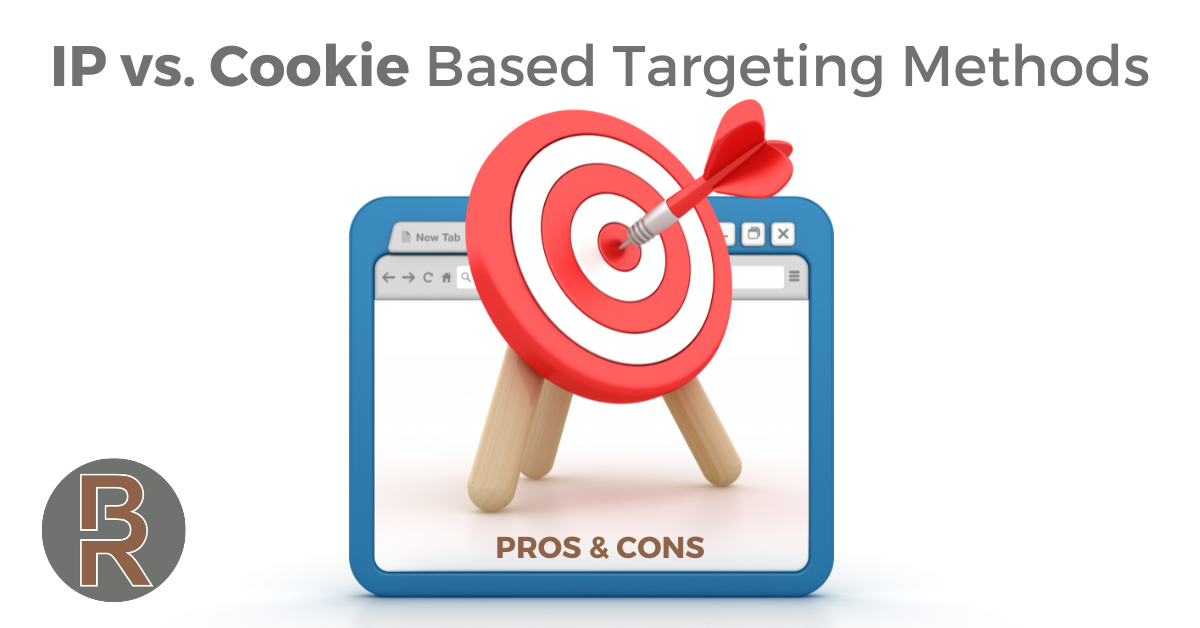
Targeting and communicating with your best consumers digitally is essential to achieving many companies’ goals. The tools and techniques available to identify relevant consumers are continuously becoming more refined. Which targeting strategy is the right one to maximize your campaign’s effectiveness and minimize waste? Well, that deserves some serious thought, and maybe a conversation about your goals and target consumers.
Let’s start with some pros and cons for two commonly used digital targeting tools; IP based, and Cookie based targeting….
IP based targeting is based on the idea that each online device has an IP address, which is in turn tied to a physical location…
There are some pros and cons with this type of location-based targeting:
Pros:
- If you know a user’s location, you can also cross reference lots of other data about them and refine your targeting…
- Personal information becomes available…
- Things like Household Income
- Children in the home
- Education levels
- Personal information becomes available…
There is a multitude of consumer demographic data available based on physical location in most developed countries. This compilation of data allows marketers to customize ads to consumers based on that available data, which can be used for both online & offline media and communication.
Cons:
- Physical locations often have more than one device, and each device can have more than one user, and multiple users often can’t be separately identified through IP address alone
- Offices often share one IP address for all company devices…
- These devices may also route through a corporate IT central hub, which may be in a completely different city or country.
- User data may be encrypted or shielded for a “wee bit of anonymity,” but with enough attention to detail and additional data sources, there are valid concerns for individual privacy.
Cookies… you’ve probably seen those little notifications and consent forms pop up on your phone or device informing you that a site uses cookies… but how exactly do we use them? Well there are many types of cookies, with different functions, but they are basically lines of code to collect user data from an online device.
Pros:
- Cookies functionally improve the online experience for consumers in many ways.
- They help recognize users from site visit to visit
- They store user form fill data
- They keep track of what you put in your shopping carts
- They personalize offers which can be beneficial too, as those abandoned items in your cart often come back to you with a discount. ????
- The data collected by cookies can be used to categorize a user and their interests for behavioral targeting, which allows more relevant ads and content and an improved overall online experience.
- Knowing consumers’ historical interests, and the timing of those interests, can drive efficiency in digital ad targeting and lead to a higher return on each marketing dollar spent.
Cons:
- The data starts as device specific, and multiple users on family computers or devices may share cookie data. Which may muddy the water on a user’s interests and behavior and lead to irrelevant content and offers.
- Cookies expire, or can be cleaned out based on user preferences and settings, which may eliminate relevant, actionable targeting data
- Some cookies slow page load times and reduce the quality of a web experience
- Again, there are concerns for user privacy (hence the request for consent to cookie use appearing on many sites you use and visit)
Given the right circumstances, both of these targeting strategies can greatly improve the performance of a marketing campaign. Properly executed, both tactics can help you to reach or exceed your campaign goals. The real key is in the art of knowing when and how to use them. If you would like to talk strategy or need help ensuring you are reaching and influencing your target consumers effectively, on the right devices, at the right time, with the right message… please contact Brand Ranch Media and we can ensure you’re using the correct strategy to get the best return on your marketing investment.
- https://www.herosmyth.com/article/who-took-cookie-science-behind-targeted-advertising
- https://www.vicimediainc.com/ip-targeting-direct-mail-internet/
- https://ppcmasterminds.com/remarketing/cookie-based-vs-ip-based-remarketing-methods/
- https://web.archive.org/web/20230924165219/https://www.signal.co/blog/cookie-based-marketing-not-relevant-impactful/

1 thought on “IP vs. Cookie Based Targeting Methods: Pros & Cons”
That’s good to know that you could get access to multiple users. I feel like that would be a good way to advertise to several different people with similar interests. I should consider targeting IP addresses so I could do that if I decide to get some ads for my business.
Comments are closed.